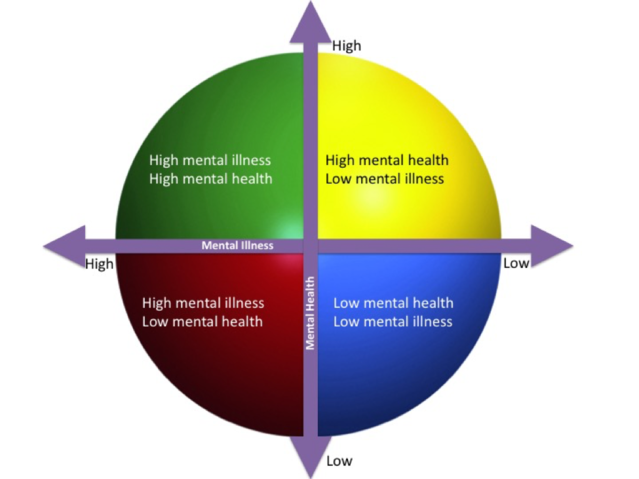Health
The Difference Between Mental Health and Mental Illness
It might not be what you think.
Posted April 12, 2018 Reviewed by Jessica Schrader
Often the terms “mental illness” and “mental health” are used interchangeably as if they are the same dimension. From this perspective, someone either has a “disorder” and requires treatment or they don’t need treatment and are fine. This perspective looks like this:

This model does not fit everyone’s experience. Mental illness and mental health are best understood as separate dimensions and both need to be addressed.
Richard first came in to see me—I’m a psychologist—distraught about how he was doing in school. He had struggled with academics all of his life and chalked it up to being dumb or unmotivated. He had tried college before, received mostly Cs, and dropped out to enlist in the Army. In the Army, he did fairly well, but not as well as he would have liked. Now, he was back and frustrated once again. As Richard told his story I noticed that he was distracted constantly by anything and everything inside my office and out my window. I asked him if he had ever been diagnosed with ADD; he said no, but he’d often wondered. He was assessed, found he did have ADD, started a medication and we worked on some strategies for working on his concentration—we completed our work together.
A year later, Richard returned. He had received all As in the past year and was excited about school. He said that every aspect of his life was different and more together, but he was struggling with his life direction. When I asked about how I could help him he said, “I realized that every decision in my life was based on trying to work around the ADD I didn’t know I had, every job, my major in school, just everything. Now, I know I can do things I hadn’t even imagined before. I need a new plan for what I’m going to do with my life.” In Richard’s example, he was treated at first for a mental disorder, ADD. Once that was identified and managed, he sought help for a life-functioning or mental health issue, building a life beyond accommodating his symptoms. For Richard, addressing both his mental disorder and his mental health was important for his ultimate life satisfaction. Richard had a low mental illness and high mental health.
Angela had been a runner since high school and, at 45, she continued to participate in four or five marathons a year. Six months ago she blew out her knee. She had surgery and was in rehab but was not yet able to run. She grew increasingly frustrated and despondent, her diet deteriorated, she was spending less time with friends (most of whom were also runners), and she was frequently short-tempered with her husband and two kids. Angela would not really fit any diagnosis of a mental disorder, but she definitely needed some help coping with her changing life circumstances. She had low mental health, but no mental illness.
George has bipolar disorder. When he was in college he had a couple of episodes of mania with psychotic symptoms that nearly completely derailed him. He had to be hospitalized at the time. However, he received good treatment and now, 10 years later, manages well with minimal symptoms. He has a good job, a great relationship, and really enjoys his life. He knows he needs to monitor his stress and mood and recognize any changes early. George might be said to have a high level of mental illness, yet also a very high level of mental health.
Many people can identify with having a bad job, a bad relationship, or difficulties coping with changes in life situations without having a diagnosable disorder. The model below more accurately fits the relationship between mental illness and mental health. Addressing both mental illness and mental health is important. If you ignore the mental health and life satisfaction issues long enough, you may develop a mental illness such as anxiety or depression. Addressing the mental health issue can prevent more debilitating problems from developing.

When we are languishing in a bad job, a bad relationship, or struggling with some other aspect of life, our mental health suffers. We may be quite miserable but that does not mean we have a mental illness. We might be said to have low mental health, but we may have a very low level or no level of mental illness. On the other hand, someone may have a chronic mental illness such as OCD or bipolar disorder but maintains well with treatment, has satisfying relationships, a job they like, and good social support. This person would be said to have a higher level of mental illness but also a very high level of mental health. Everyone at any point in time could represent any point on the two dimensions. Our state on either dimension is fluid and not static. Life circumstances change, and our state of mental health or mental illness changes with it. We can develop problems with anxiety, depression, addictions or other mental illnesses at different times in our lives. Our circumstances can change (job, family, social support, and so forth), reducing our level of mental health or well-being with or without mental disorders.
To function optimally in our lives, it is important to attend both to treating mental illness and addressing mental health. In spite of the importance of addressing mental health as well as mental illness, payment from insurance companies exclusively covers diagnosable disorders. Fortunately, there are now some excellent online and digital tools for improving mental health and well-being affordably. For example, TAO Connect has both self-help tools addressing mental health and well-being, like managing stress, anger management, communications, relationships, and mindfulness, along with tools to address common mental illness such as anxiety, depression, chronic pain, and alcohol and drug dependence. Addressing our lives comprehensively, examining both dimensions, and ensuring that we have multiple sources of well-being like diet, exercise, social support, and activities that provide a sense of meaning help us to live more satisfying lives.
Disclaimer: Some names and identifying details have been changed to protect the privacy of individuals.


